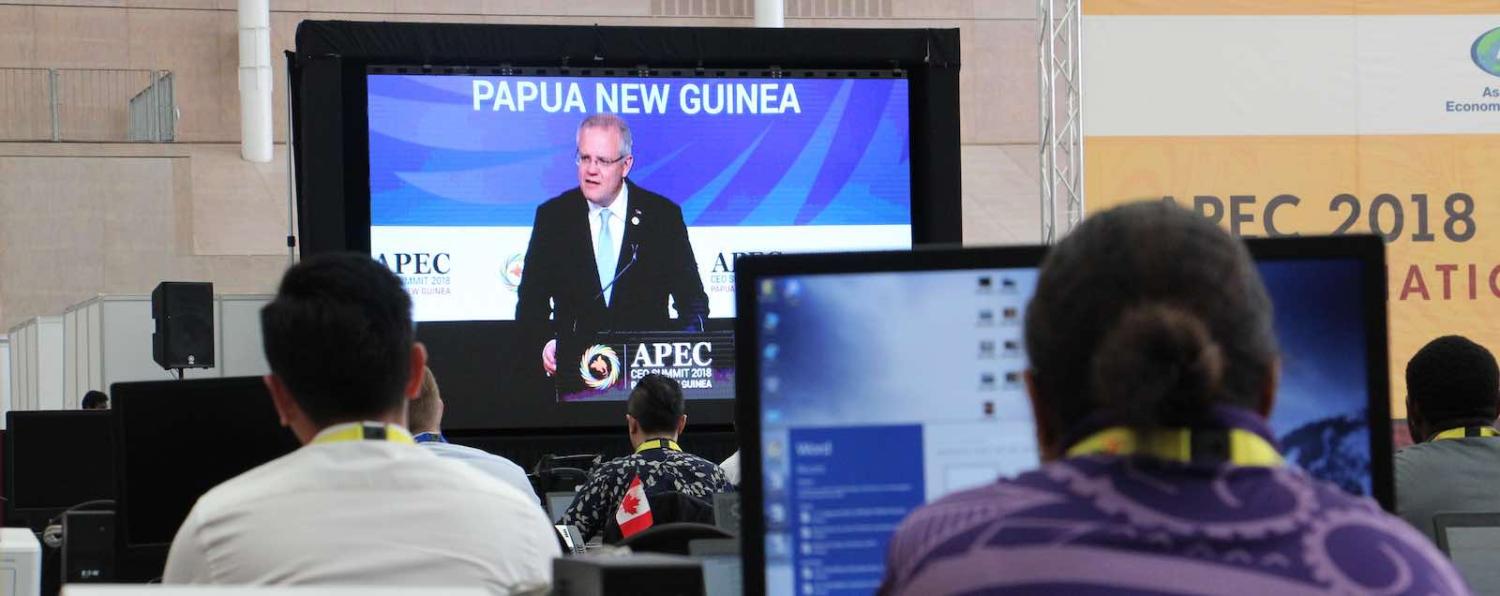The statements about the importance of the Pacific to Australia by Prime Minister Scott Morrison and Foreign Minister Marise Payne, backed by the Foreign Policy White Paper last year, are most welcome. The further decisions announced at APEC last week did even better. The fact is, Australia has not done much well in the Pacific (excluding Papua New Guinea’s independence and the RAMSI force in the Solomon Islands) since the Second World War. It’s about time.
The fact is, Australia has not done much well in the Pacific since the Second World War. It’s about time.
But recent history has not been without a gaffe. It was a great shame that Morrison’s first foray into Australia’s Pacific policies featured a needless mistake. Within days of taking over as PM, he decided to skip the annual meeting of the Pacific Islands Forum. This event happens only once a year, it only takes a day away from home, but it’s immensely important to Pacific leaders as their annual face-to-face with their larger partners, notably Australia and New Zealand.
To not go was a real slap to Pacific leaders, and was particularly counter-productive at a time when Australia’s role in the Forum is still under challenge from Fiji, smarting even now from Australia’s attempts to isolate the country after Frank Bainimarama’s 2006 coup. Morrison spent the day instead touring rural Australia – a perfectly reasonable thing to do, but something that can be done on any of the other 364 days of the year.

To the good. The Government’s rediscovery of the Pacific covers important ground, some of it even new. (ASPI’s Michael Shoebridge provides an excellent summary of this “Pacific pivot.”) The expanded agricultural workers scheme, the considerable increase in aid, and the creation of a Pacific office within the Department of Foreign Affairs and Trade, are important.
In particular, the decision to open Australian diplomatic posts, finally, in all the remaining Forum countries is hugely significant. Having a resident Australian diplomatic post in a partner country conveys the best message – respect, and interest, two things Australia has not been much good at in the past. It’s a shame, however, that this will only be done apparently over (more) years, which may leave opportunities to change the decision over time (Treasury hates overseas posts and frequently has a shot at closing some. Years ago, it tried to close either Singapore or Kuala Lumpur on the grounds that these two capitals were really quite close to each other, so Australia did not need both.)
It is, of course, a pity that this flurry of Pacific activity will be seen as (and no doubt is) a result of seeking to compete with China. Still, good results can be welcome whatever the motivation. Pacific leaders will resent being played as pawns in a bigger game but will see opportunities to exploit their new bargaining power.

Yet there is also an omission – or omissions, really. The big one, of course, is climate change – a victim to domestic Coalition infighting. But the omission I want to take up is the dreadful decision to kill off Radio Australia’s broadcasting to the Pacific – an absurd act given the renewed focus on this very region.
Let’s be clear. The Radio Australia broadcasts were universally welcomed and listened to around the Pacific. It was remarkable that even – indeed, especially – on remote islands and in villages, the distinctive tones of the ABC news intro could be heard.
And these broadcasts were not just of Australian domestic programs: Radio Australia had its own collection of local journalists around the Pacific. They worked enthusiastically to send in local news items. These were collated in Melbourne and featured in Radio Australia’s content. Nothing can be more appreciated anywhere than hearing about one’s own news, and in the Pacific, the Radio Australia services were often the only source of that local news. This was particularly true in the Tok Pisin-speaking regions of PNG, Solomon Islands, and Vanuatu.
Radio Australia was also the only news service which told people about the region more broadly, since island states’ own broadcasts never have the means to cover other regional countries, too. That made Radio Australia the preferred and respected purveyor of news and programs all around the region, much in the way that BBC is followed so closely in the Middle East.
So here are three recommendations for the government if it is sincere in fostering the best outcomes for Australia in the Pacific region:
First, reinstate the Radio Australia full-time service to the Pacific with a proper quota of regional news from regional correspondents, and with content which appeals to local audiences.
Second, reinstate the fulltime Tok Pisin-language programming directly to and for PNG, Solomon Islands, and Vanuatu.
Third, be adventurous, and create programming for the east and west Polynesian states in Samoan, Tongan, and Cook Islander/Tahitian language.
And here’s what not to do: do not seek to get around this need by resorting to Australian domestic commercial broadcasters. Their domestic programs are entirely unsuited to the Pacific, and the organisations themselves have little empathy indeed for the region and no interest beyond creating another profit centre. Yet Morrison has announced that he is “in talks” with the “Free TV” group to beam their content into the Pacific.
It’s worth remembering the level of commercial commitment.
During the devastating cyclone Fiji, that hit Fiji in 2016, one of the Australian TV commercial channels sent a team to Fiji cover it. But on arriving, they found that their main domestic rival had not bothered to send a team. So they turned around and went straight back to Sydney.

